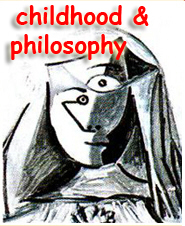reframing and practicing community inclusion. the relevance of philosophy for children
Keywords:
Democracy, Interculturalism, Lipman’s P4C, ResponsibilityAbstract
I wish to carry out a philosophical inquiry into the present day intercultural public spheres. The thesis I endeavour to support is that the achievement of inclusive public spheres (namely, with respect to our European and Western experience, the accomplishment of democracy) largely depends on one’s willingness and capacity to foster the “appreciation of diversities” by first, enhancing policies and forms of cooperation between the citizens’ emotional and motivational resources, and then enhancing their cognitive competences. More specifically, my proposal is to understand such an effort from the viewpoint of post-Weberian responsibility, that is of an ethics and politics that overcome the traditional divisions between theory and practice, cognition and emotion, “Verantwortung” (responsibility) and “Gesinnung” (conviction), and therefore succeed in enhancing the citizens’ awareness and attitudes as – in Habermas’ words – “democratic co-legislators”. The case study of Matthew Lipman’s “Philosophy for Children/Community” succeeds precisely in highlighting these results.Downloads
Download data is not yet available.
Downloads
Published
2015-01-30
Issue
Section
articles



